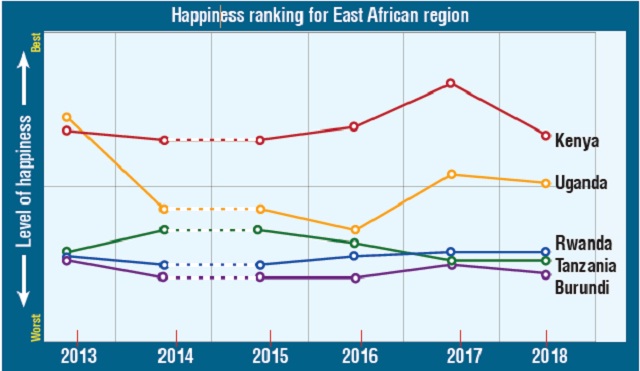
According the 2018 report, there has been general consistency among the top ranking happy countries.The top 10 happiest countries were top-ranked in World Happiness Report 2017. There has been some swapping of places but the top five countries are the same ones that held the top five positions in World Happiness Report 2017. Finland, however, vaulted from 5th place in 2017 to the top of the rankings in 2018. The regular countries in this cohort are Norway, Denmark, Iceland, Switzerland, and The Netherlands, Canada, New Zealand, Australia and Sweden. These countries are also the ones that have the highest GDP per capita in the world.
But Uganda is not the only one where happiness levels are going down. According to the survey, the countries where citizens feel far less happy today than they were a few years ago are Ukraine, Yemen, Syria, Malawi, and Venezuela – which is embroiled in an ongoing international banking crisis.
This year, however, the World Happiness Ranking has focused on the issue of migration; both international and local – from rural to urban areas. The survey reports that generally, people who migrate are often as happy in the places they eventually settle as the residents there.
Therefore, Ugandans migrating to Dubai in the United Arab Emirates are likely to report being happy as the residents there. However, there are other considerations. Such as whether the community welcomes them and they have a job, and whether the job is permanent or temporary. The reports says migrants who have permanent jobs are happier. In terms of destination, the UAE, Qatar, and Saudi Arabia are favourable destinations. The United Kingdom is a more favourable destination for migrants than the U.S. In Africa, Zambia is the best place for migrants. It is better than South Africa.
The impact of migration on those who are left behind is also assessed. The results here are mixed too and they depend on the fortunes of the migrant. If they are happy and supportive, those left behind will be happier and the inverse is true.
The survey is edited by John F. Helliwell of the Vancouver School of Economics at the University of British Columbia, and Canadian Institute for Advanced Research, Richard Layard, from the Wellbeing Programme, Centre for Economic Performance, at the London School of Economics and Political Science, and Jeffrey D. Sachs, Director, SDSN, and Director, Center for Sustainable Development, Columbia University.
 The Independent Uganda: You get the Truth we Pay the Price
The Independent Uganda: You get the Truth we Pay the Price


 Who is Pope Leo XIV?
Who is Pope Leo XIV?
